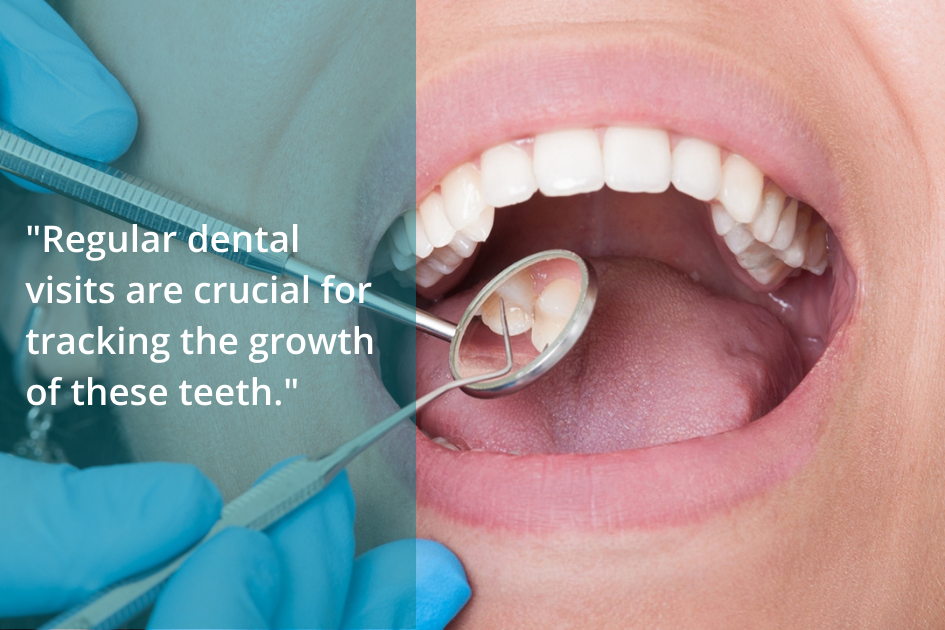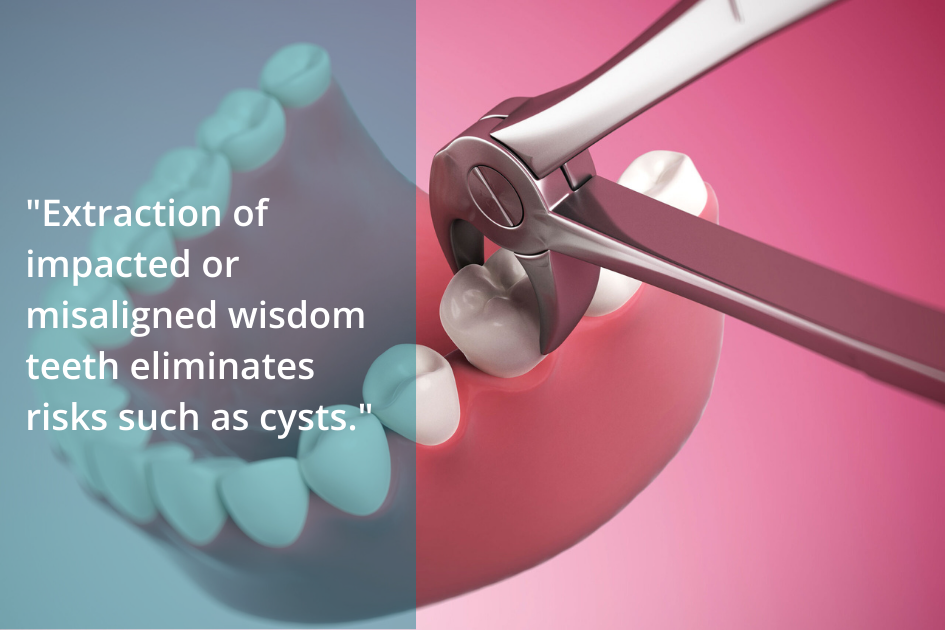Ever experienced the discomfort and wondered if you should get your wisdom teeth removed? This discussion is not just about extraction but also considers factors such as age, alignment, and overall dental health.
Insights that could potentially alter your perspective on those late-emerging molars will be presented. Are you prepared to comprehend the wisdom behind your wisdom teeth? Let’s plunge into the topic, shall we?
Understanding Wisdom Teeth
Let’s explore the concept of wisdom teeth, also referred to as the last set of molars. These teeth typically sprout in the rear of our mouths during our late teenage years or early adulthood. Generally, we possess four wisdom teeth, but occasionally, complications may occur. They can become impacted, or stuck in the jawbone or gums, which can lead to a variety of dental issues.
Given their location at the rear of the mouth, maintaining their cleanliness can be challenging, making them susceptible to infections and cysts. The common surgical intervention of wisdom teeth extraction often becomes necessary to tackle these problems. Regular dental visits are crucial for tracking the growth of these teeth and ensuring the best possible oral health.
Reasons for Wisdom Teeth Removal
We’ll now examine the reasons that often necessitate the removal of wisdom teeth. This may include a variety of factors. The determination also significantly depends on the individual’s age and overall dental health status.
Pain and Discomfort
Experiencing pain and discomfort, particularly when wisdom teeth grow in at abnormal angles or become impacted, is a prevalent reason for extraction. An impacted wisdom tooth can lead to swelling and inflammation, resulting in substantial discomfort.
These teeth can create pockets where food and bacteria become trapped, resulting in pain and heightening the risk of infections such as pericoronitis, cellulitis, and abscesses. These conditions can induce severe pain and demand extraction. Occasionally, cysts may develop around impacted wisdom teeth, intensifying the discomfort.
Under these circumstances, it’s highly advised to consult dental professionals who can offer personalized advice based on your particular situation. Always remember that maintaining your oral health is critical, and unnecessary suffering from pain and discomfort should never be neglected.
Crowding and Misalignment
The primary reasons for wisdom teeth extraction are often pain and discomfort. However, another overarching concern is the crowding and misalignment that these teeth can trigger in the mouth. Wisdom teeth have the potential to disturb the placement of other teeth, resulting in their shift and causing alignment problems.
Wisdom teeth that are impacted, growing at an angle or sideways, pose particularly difficult situations. Such teeth can force other teeth out of their original spots, creating complications for the bite and overall oral health. Other problems may include cysts, jaw complications, or persistent discomfort.
Cleaning Difficulty
Are you aware that the location of wisdom teeth at the rear of the mouth can make them notoriously hard to clean, often leading to their removal? This challenge in cleaning can result in a range of dental issues.
For example, impacted wisdom teeth can become a trap for food and bacteria, heightening the threat of tooth decay and gum disease. If these teeth aren’t properly cleaned, infections such as pericoronitis, cellulitis, and abscesses might develop. In scarce instances, cysts and benign growths can form around impacted or partially erupted wisdom teeth, adding to the complexity.
Also, the inflammation of gums around wisdom teeth can intensify the difficulty of cleaning, thereby escalating the risk of cavities. Upholding superior oral hygiene can prove to be quite a hurdle with wisdom teeth.
Potential Complications
Impacted wisdom teeth may result in several complications in various instances, necessitating their extraction to ensure optimal oral health. These complications frequently arise due to the positioning of these teeth, which makes them hard to clean and increases their vulnerability to tooth decay and gum disease.
Potential complications comprise:
- The crowding or movement of other teeth caused by impacted wisdom teeth can lead to discomfort and issues with the bite.
- The buildup of food and bacteria can result in tooth decay, gum disease, and infections such as pericoronitis.
- Rare complications such as cysts and benign growths could occur around impacted wisdom teeth.
- Cleaning wisdom teeth can be challenging, escalating the risk of oral health problems.
- Extraction as a preventative measure can help circumvent future dental issues and protect overall oral health.
Age and Oral Health
Dentists often suggest the extraction of wisdom teeth during late adolescence or early adulthood. This timeframe is usually associated with simpler procedures and quicker healing. Fewer complications after surgery are also observed within this age bracket. This is primarily because the roots of the wisdom teeth aren’t yet fully developed, minimizing the risk of issues during extraction.
However, mature adults may encounter difficulties owing to completely developed roots and a more solid jaw bone. Impacted wisdom teeth can also lead to severe dental complications, such as infections and harm to neighboring teeth. Hence, young adults must uphold excellent dental hygiene and seek advice from an oral surgeon if they notice any discomfort or unusual signs.
Wisdom Teeth Extraction Process

The process of extracting wisdom teeth, a routine surgical procedure, involves meticulous steps. It begins with the application of local anesthesia to desensitize the area surrounding the tooth socket. Ordinarily, oral and maxillofacial surgeons conduct this operation. One of our primary goals is ensuring a disease-free New Braunfels TX; hence, wisdom teeth removal tends to be a preferable option if they lead to problems.
The extraction procedure encompasses:
- Making sure the area is numb for the patients’ ease
- Gently dislodging the tooth from the socket
- Extracting the tooth, sometimes in fragments
- Cleaning the area to ward off infection
- Giving necessary instructions for post-surgery care
The decision between surgical extraction and retention relies on multiple factors, one of them being the possible impact on adjacent teeth.
Post-Operation Care
Following the removal of wisdom teeth, it’s vital to adhere to the proper post-operation care for a swift, uncomplicated recovery.
We’ll discuss effective strategies for managing pain, methods to alleviate swelling, maintaining good oral hygiene, dietary suggestions after the extraction, and the importance of sufficient rest.
We aim to provide you with the necessary knowledge to navigate through this healing stage with comfort and assurance.
Pain Management Strategies
Effective pain management post wisdom teeth extraction is vital, and this can be achieved by using non-prescription medications such as ibuprofen or acetaminophen. These are the most prevalent choices for pain relief after the operation.
Some key points to consider:
- Enhanced pain relief can be achieved by mixing ibuprofen and acetaminophen after wisdom teeth extraction.
- Acetylsalicylic acid should be avoided as it may lead to increased bleeding post-procedure.
- Bromelain, a natural compound, can help in reducing inflammation.
- Applying an ice pack on the affected area can be beneficial in pain control and mitigation of discomfort.
- Regular appointments with your dentist are necessary to track the healing progress and manage potential complications.
These strategies play a significant role in ensuring comfort and successful recovery following the surgery.
Understanding Swelling Reduction
After undergoing wisdom teeth extraction surgery, it becomes essential to know how to effectively lessen swelling, a prevalent post-surgery side effect. This swelling usually reaches its peak within 2-3 days and then slowly starts to decrease.
It’s crucial to realize that using an ice pack on the swollen area can help in reducing the swelling. Adherence to the dentist’s post-operative care advice, which includes ice pack application, is vital for a smooth recovery. Decreasing swelling isn’t solely about achieving comfort, but it also plays a significant role in the healing process.
Proper Oral Hygiene
While discussing the importance of minimizing swelling after wisdom teeth extraction, it’s essential not to ignore the pivotal role of adequate oral hygiene in post-operation care. Wisdom tooth growth can lead to complications, especially in the soft tissue around the extraction area.
Here are some methods to avert issues such as dry socket:
- Brush your teeth delicately, steer clear of the extraction site, and rinse using a saltwater solution to keep infection at bay.
- Avoid activities such as using straws and smoking, which can displace the healing blood clot.
- Regularly changing gauze pads over the extraction area helps manage bleeding.
- Follow your dentist’s guidance regarding medication usage and oral care routines strictly.
- Ensure you attend all follow-up appointments, enabling your dentist to oversee your recovery process.
Dietary Recommendations Post-Extraction
Following the extraction of your wisdom teeth, adhering to certain dietary guidelines is essential to ensure a smooth recovery and prevent complications. We advise a post-extraction diet comprising soft foods such as yogurt, smoothies, and mashed potatoes. These foods are gentle on the extraction site and aid in the healing process. It’s crucial to steer clear of hard foods that could irritate or interfere with the healing area.
Keeping yourself well-hydrated is also critical. Consuming plenty of water helps speed up recovery and ward off dry socket, a condition that can cause significant discomfort. However, it’s important to abstain from using straws as they can dislodge blood clots and hinder the healing process.
Rest and Recovery Time
Ordinarily, the rest and recovery period after wisdom teeth extraction ranges from a few days to a week. According to the Association of Oral and Maxillofacial Surgeons, the treatment of wisdom teeth usually involves a resting and healing phase.
Complications From Extraction
While wisdom teeth extraction offers several benefits, it isn’t without potential complications, such as nerve damage, infection, and slower healing. These problems can materialize, especially when post-operative care guidelines aren’t strictly adhered to. Nerve damage, though uncommon, could result in a changed sensation in the lower lip, tongue, or chin.
If one smokes during the recovery period, it can exacerbate these complications, leading to a dry socket – a painful condition that arises when the blood clot safeguarding the exposed bone gets dislodged. This can also slow down the healing process and enhance the probability of infection. Knowledge about these potential risks is crucial for making a well-informed decision about extraction and ensuring more effortless recovery.
Dealing With Post-Surgery Pain

Handling post-surgery pain after wisdom teeth extraction is vital and can be effectively accomplished with certain medications such as ibuprofen or acetaminophen. To mitigate the discomfort, we propose:
- Using ibuprofen or acetaminophen for pain mitigation.
- Mixing ibuprofen and acetaminophen for enhanced comfort.
- Avoiding aspirin due to the risk of bleeding.
- Thinking about bromelain supplements to diminish inflammation.
- Putting an ice pack on to lessen swelling.
We comprehend the discomfort linked with wisdom teeth extraction, but these strategies make managing post-surgery pain a feasible task. It’s essential to remember that each person’s pain experience is distinct, so adapt these strategies according to your requirements.
Long-Term Effects of Removal
Our comprehension of the individual elements that contribute to the removal of wisdom teeth allows us to examine the long-term consequences of this surgical procedure.
- Stopping potential dental problems is a main advantage. This entails preventing teeth from becoming overcrowded and skewed and mitigating the challenges in cleaning caused by the location of wisdom teeth.
- Extraction of impacted or misaligned wisdom teeth eliminates risks such as cysts, issues with the jaw, and discomfort.
- Over an extended period, extraction can contribute to enhanced oral health and a decreased likelihood of infections.
- The surgical procedure can also boost general dental cleanliness, helping to prevent gum disease and tooth decay.
- Finally, engaging in a discussion with a dental professional is crucial in evaluating the long-term pros and cons of wisdom teeth extraction for each specific case.
Conclusion
Deciding on wisdom teeth removal isn’t a standard solution for everyone. It’s contingent upon various elements, such as age, alignment, and the status of your overall dental health.
Although extraction is a routine procedure, potential complications can arise. Regular visits to Great Oaks Dentistry, New Braunfels, TX can aid in monitoring your wisdom teeth and oral health.

